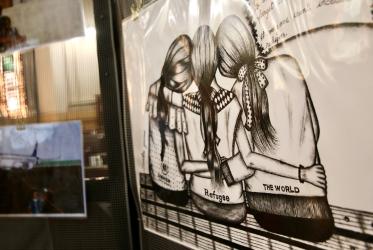Shortly after a two-and-a-half-day fact-finding mission to the Dominican Republic, World Council of Churches (WCC) communications spoke with Sophia Wirsching, policy adviser on migration and development at Bread for the World, the German Protestant development service.
The mission was organized by the WCC in partnership with Bread for the World.
Wirsching described how the issue of statelessness is lingering for thousands of people in the Dominican Republic, as well as how statelessness results in the denial of many basic human rights.
Q: How many people are now stateless in the Dominican Republic?
Wirsching: There are no accurate numbers available, and that is part of the problem. In 2014 there were an estimated 200,000 people considered stateless who could then legally apply to become citizens. Only 55,000 of those did apply, and only 5,000 of them could obtain papers. There are still a lot of people waiting for their papers. So the issue is quite pervasive.
Q: In what ways can the church be a voice for stateless people in the Dominican Republic?
Wirsching: The church, that is the collective church, has taken on a very ambivalent role in the Dominican Republic. You cannot define the church as one actor. There are faith-based organizations in favor of the rights of people threatened by statelessness but other major figures in some churches have actually expressed consent with the law of the government. What is important is that churches raise awareness that basic human rights are being violated, that they take on an advocacy role on behalf of the vulnerable. People are being deprived of their nationality.
The WCC Den Dolder Recommentions suggest several forms of actions for churches and church-related groups to protect the stateless and end statelessness. Churches could offer birth registration services, for instance. Many people who are now stateless live far from government structures. Yet churches exist almost everywhere so they could actually do the documentation of people who exist but nobody is acknowledging them. Church actors can also conduct periodic reviews to improve the human rights situation in their communities and throughout the Dominican Republic.
It’s important that non-government organizations contribute to this process as well, by speaking out.
Q: How does statelessness intersect with racism in the Dominican Republic?
Wirsching: There is a lingering animosity between Haiti and the Dominican Republic, and that is very emblematic in the law. It greatly affects the sugarcane workers, who are the most marginalized. They are unable to enact their right to education, to healthcare. But also you don’t have the right to own property when you are not registered so they are denied the right to improve their living situation. There is strong discrimination against French-speaking Haitians in the public discourse. Haitians are stigmatized as being poor or being criminals who are “invading” the Dominican Republic. There is a great fear of people of colour.
WCC work for the rights of stateless people
The Den Dolder Recommendations to Protect the Stateless and End Statelessness







